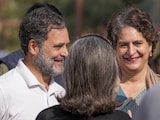UK Prime Minister Rishi Sunak on Monday dismissed rumours that he would quit before the July 4 general election, as criticism about his early departure from D-Day commemoration events rumbled on.
The Conservative leader issued an apology after outrage from veterans' groups that he declined to join other world leaders at an event in northern France to mark the 80th anniversary of the invasion.
His decision to instead record a television interview, which also prompted criticism from his own colleagues, was the latest misstep on the campaign trial for the vote.
But Sunak, who opinion polls predict will lead the Tories to a shuddering defeat to the main opposition Labour party, was defiant. "People are gonna say what they're gonna say," he said.
He warned against thinking the election result was a foregone conclusion, and said he had battled back from adversity before, notably after an internal Tory leadership defeat to Liz Truss in 2022.
"The reality is I'm not going to stop going, I'm not going to stop fighting for people's votes, I'm not going to stop fighting for the future of our country," he added on a campaign stop.
Sunak had until January next year at the latest to call a general election but decided to do so early as inflation slowed, indicating a turnaround in the parlous state of the country's economy.
The announcement -- made during a downpour in Downing Street -- took his own party by surprise, sending it scrabbling to find candidates to stand for the 650 parliamentary seats up for grabs.
Other unforced errors before the D-Day decision included a campaign stop near where the Titanic was built, prompting comparisons of his leadership to the captain of a sinking ship.
'Out of touch'
Sunak, a 44-year-old former financier who has been prime minister since Truss's short tenure ended in October 2022, has also faced questions about the veracity of his repeated claims about Labour's personal tax plans.
He will likely face further scrutiny as the Tories, in power since 2010, publish their formal policy proposals on Tuesday.
Labour launches its manifesto on Thursday. Party leader Keir Starmer on Monday said there would be "no tax surprises" in it for working people.
The smaller opposition Liberal Democrats launched their 116-page manifesto on Monday, with repeated attacks on the Tories' record in government.
"This election is our chance to win the change our country desperately needs... These Conservatives have got to go," party leader Ed Davey wrote in the foreword, calling them "out of touch" with ordinary people.
The Lib Dems, which were the junior partner to the Tories in a 2010-2015 coalition government, are predicted to become the third-biggest party after the election.
Among their proposals are greater investment in renewable energy to drive economic recovery and a ban on water companies dumping raw sewage into rivers, lakes and coastal areas.
The pro-European party also promised to rebuild ties with Brussels after Brexit, and to rejoin the European single market, although it did not set out a timeline.
The Lib Dems -- long-standing proponents of electoral reform to end the UK's first-past-the-post system and give smaller parties a greater say -- want to restore international development spending to 0.7 percent of gross national income.
That spending was cut to 0.5 percent in 2020 during the pandemic when Sunak was finance minister.
(Except for the headline, this story has not been edited by NDTV staff and is published from a syndicated feed.)















